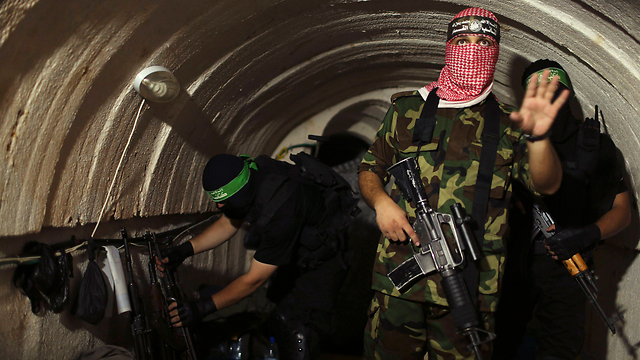Hamas: Don't want war with Israel, tunnels are defensive
Hardliner founder Mahmoud al-Zahar, who survived two Israeli assassination attempts, says tunnels are nothing against Israel's military might.
A senior leader of the Islamist group Hamas said the Palestinian movement was not seeking a new war with Israel and insisted a network of tunnels it is digging, some of which have reached into Israel in the past, was "defensive."
Speaking to members of the Foreign Press Association in Gaza, Mahmoud al-Zahar, a medical doctor seen by many as a hardliner, suggested the prospects of reconciliation with the rival Fatah party of President Mahmoud Abbas were slim, despite years of international efforts to forge unity.
"I think nobody here in the region is looking for a war," said Zahar, 71, who has survived two Israeli assassination attempts, one of which, in 2003, killed his son.
"We are not looking for any confrontation with Israel, but if they are going to launch an aggression we have to defend ourselves," he told reporters late on Wednesday.
Hamas seized control of Gaza in 2007 after a brief civil war with Abbas's forces. It maintains strict security over the coastal territory, where more than 1.9 million people live. Zahar is one of Hamas's founders and one of its most senior figures in Gaza, regarded as close to the military wing.
Asked why Hamas was building tunnels, Zahar said they were defensive and suggested they were nothing against the might of the US-supplied Israeli military.
"You are speaking about tunnels? You are not speaking about F-35 (fighter planes)? You are not speaking about the nuclear bomb in Israel... The tunnels are a matter of self-defense," he said.
Hamas's armed wing has lost 10 fighters this year in tunnel collapses. In strongly worded speeches, the group's leaders have pledged to pursue the tunnel building, prompting alarm in Israel, which has stepped up efforts to find the tunnels and stop them reaching its territory.
Internal split
With an Israeli-Egyptian blockade on Gaza making it difficult for goods and people to move in and out of the territory, Hamas and Fatah have made efforts to reconcile their differences and form a functioning unity government.Yet the latest round of discussions in the Qatar capital Doha has become bogged down, despite early signs of progress, and Zahar gave the impression that a deal was some way off.
He said Abbas and Fatah were not sincere about achieving reconciliation, a charge Fatah threw back. He also vowed that his group would never recognise the state of Israel, which Abbas and Fatah have done and want Hamas to do.
"They (Fatah) have no will to achieve an agreement. There is no intention," he said.
The blockade on Gaza and the breakdown of relations with Fatah have created huge strains on the economy in Gaza. Since Fatah controls the budget from the West Bank, it has so far resisted making payments to security forces and other state employees in Gaza who were hired by Hamas since 2007.
As a result, Hamas is heavily dependent on support from abroad, including Qatar, Saudi Arabia and Iran. While Saudi and Iran are at odds, Zahar said Hamas was not taking sides.
"We are looking to have good relations with everybody," he said. "We will not play any factor or element in the internal or external confrontation between these countries."











